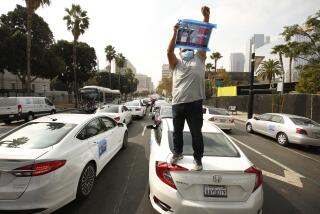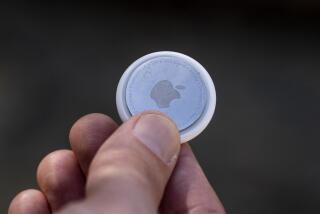Court says reading smartphone map while driving is not a crime
Good news for Wazers: On Thursday, a California appellate court ruled that looking at a smartphone map while driving is not against the law.
A three-judge panel of Californiaâs 5th District Court of Appeal threw out the distracted driving ticket Steven Spriggs got two years ago for looking at his cellphone map while stuck in highway traffic in Fresno.
The court unanimously concluded that the state Legislature meant only to prohibit âtalking and listeningâ â and not any other cellphone activity â when it passed a distracted driver law in 2006.
âThis is not surprising,â wrote the court, âgiven that when the statute was enacted in 2006, most wireless telephones were just that â a telephone â rather than an electronic device with multiple functions.â (But donât get too excited, textaholics. The Legislature specifically banned texting while driving in 2009.)
Still, the decision was an important clarification, as many people behind the wheel pick up their smartphones for map and traffic applications such as Waze or Google Maps, to check the time, or even, as the court noted, to use as paperweights.
(Hereâs what the law says: âA person shall not drive a motor vehicle while using a wireless telephone unless that telephone is specifically designed and configured to allow hands-free listening and talking, and is used in that manner while driving.â The court determined that âuseâ in the context of the law only refers to holding the phone and having a conversation, not merely holding it or looking at it.)
âRight now the police jurisdictions should be on notice,â said Spriggs, 59, a soft-spoken Cal State Fresno fundraiser. âIâve been contacted by dozens and dozens of people who have traffic court scheduled in the next week, and theyâve been asking me how I beat the case.â
Turned out, the third time in court was the charm for Spriggs, who first challenged his $165 ticket in traffic court (and lost), then fought the ticket in Fresno County Superior Courtâs appeal division(and lost again).
His appellate attorney, Scott Reddie of Fresno, had a personal interest in the case. Some years back, Reddie was ticketed for driving while eating a hamburger and drinking a soda. The officer said Reddie had no hands on the wheel, but the ticket was dismissed when Reddie showed a judge an In-N-Out receipt showing he had not purchased a drink.
In an illustration of how confusing the law can be (and how versatile cellphones are), Spriggs said that during oral arguments on Feb. 13, the presiding judge asked the prosecutor, Deputy Atty. Gen. Doris Calandra, whether it would be legal to use a cellphone as a flashlight to illuminate a paper map at night if a carâs dome light did not function? (Probably illegal, she said.) What about holding up a cellphone to block the sun shining in the driverâs eyes? (Probably legal.)
The decision takes effect in 30 days, and the state has 10 days after that to decide whether to appeal the decision to the California Supreme Court.
In the meantime, said Reddie, he thinks people fighting similar tickets should bring a copy of the decision to court with them.
And to be clear, Reddie said, he and Spriggs never maintained that reading a map while driving a car is good, safe practice. They simply argued that the statute Spriggs was convicted of violating does not prohibit such behavior.
âPresently there is not a statute that says you cannot look at a map application while driving,â said Reddie. âThatâs an issue the Legislature needs to deal with.â
Or not, letâs hope.
ALSO:
Twitter: @robinabcarian
His appellate attorney, Scott Reddie of Fresno, had a personal interest in the case. Some years back, Reddie was ticketed for driving while eating a hamburger and drinking a soda. The officer said Reddie had no hands on the wheel. The ticket was dismissed when Reddie produced his receipt, proving he had not purchased a drink.
More to Read
Sign up for Essential California
The most important California stories and recommendations in your inbox every morning.
You may occasionally receive promotional content from the Los Angeles Times.











